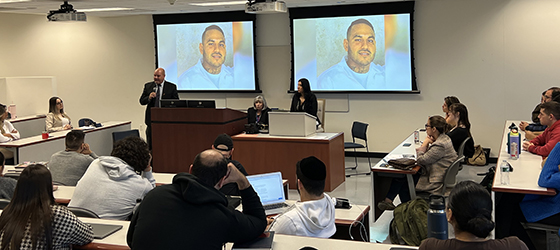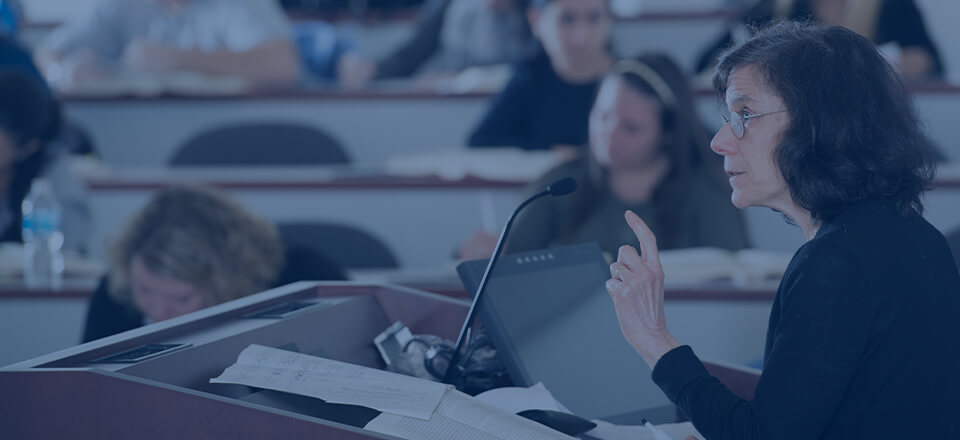Criminal Law Spotlight
Criminal Law Spotlight

Professor Myra Berman teaches the foundations of criminal law in her first-year class. She covers, among other things, criminal acts, the criminal mind, causation, theft crimes, domestic violence, conspiracy, and homicide. This semester, her students also got a first-hand lesson from some unexpected guests.
Texas Inmate Joins the 1L Criminal Law Class
As a special part of this year’s unit on homicide, Professor Berman welcomed via phone an inmate at a Texas maximum security prison, who is serving a life sentence for first-degree murder. Also in the classroom were Suffolk County Judge Fernando Camacho, who presides over Suffolk County’s Concepts Court, which offers a wide array of services and support to court-involved juveniles and Karen Petoske, a staff attorney at the Suffolk County Legal Aid Society and a 2023 graduate of Touro Law.
Convicted of Murder, Following a Confession at Age 15
Texas prison inmate Juan talked to students about the circumstances that led him to confess to murder 15 years ago, a murder he committed at the age of 15. He has not been represented by any attorney since his plea allocution and sentencing in 2008. Juan discussed a traumatic incident in his life that happened months before the murder, when his dad raped and murdered his mom in their bedroom while Juan was home with his siblings. He spoke about his positive life experiences before the night of his mother’s death, and then discussed details about living with his grandparents after his mom’s death and falling in with older kids he felt compelled to impress, to prove that he was a man, even though he had not been able to save his own mother. He spoke about the night of his crime, about firing the shots out of the gun he was carrying and killing an innocent victim, about the circumstances of his arrest, and details about his incarceration, including the fact that there was no lawyer present at his interrogation and he didn’t even know that he had a right to remain silent. Juan also told students that he waived his right to an appeal when he pleaded down from capital murder, which would have carried a sentence of life without parole, to murder in the first degree, which meant life in prison. He freely shared his thoughts on justice, rehabilitation for individuals after a crime, the need for incarceration, and the ability to grow and change as a human. He told students that he takes full responsibility for his crime, and that he has grown up and matured during his incarceration but nevertheless feels enormous guilt about what he’s done and terrible pain for the family of his victim. Juan also touched on restorative justice and his plans for the future which include returning to the prison if and when he is released to try to help other youth who are in the position he was in when he committed the murder.
Court-Involved Youth
Karen Petoske, a Suffolk County Legal Aid Attorney in the Youth Court who would handle this type of case in NY, addressed the class about how trauma (like Juan’s) often leads to criminal acts; and she spoke about how this kind of case might have been handled in New York. Judge Camacho addressed both Juan and the class to discuss justice, reform, and handling youth in the criminal justice system. He also spoke to students about their responsibilities as lawyers once they graduate.
Lessons Learned
Professor Berman stated, “It was a unique and compelling experience to incorporate into our first-year criminal law class an honest, open, painful conversation with a 31-year-old man, convicted of first-degree murder when he was 15 years old, who is still serving his time, with no possibility of parole for another 15 years. My students spend weeks studying criminal cases and debating issues of crime and punishment in the classroom. However, nothing could truly prepare us for the power, the value of having this dialogue with someone who had taken another human life; the presence of a member of the bench and another of the bar, both of whom deal with such situations, added significantly to the benefit of this experience for all of us: the students, the teacher, the lawyer, the judge. It provided an invaluable perspective into the complex mind and motivations of a criminal that no textbook could ever convey and no lawyer should ever forget.” She continued, “Being able to ask him direct questions helped shed light on how certain societal failings may contribute to such acts of violence. It reinforced the need for a justice system that balances punishment, rehabilitation, and public safety. I am so thankful to Juan for sharing his thoughts, his guilt, his pain, his dreams, and his hopes with my class and to Karen Petoske and Judge Camacho for their invaluable contributions to our discussion.”
Student Perspective
Crystal Halley, a first-year student, found the class insightful. She reflected, "I am thankful to Juan for his vulnerability and honesty, and thankful to Professor Berman for organizing an opportunity most law students never have, especially first semester 1Ls. It is easy to sometimes become desensitized to the plight and experience of a prisoner, especially when we consider the context of murder. However, hearing Juan’s story and the circumstances that ultimately led to him committing the offense reminded me to always have compassion and understanding for others, and echoes the exact reasons we’ve embarked on this journey to become lawyers. Juan expressed guilt for his crimes, and how he’s since discovered a passion for mentoring others. It was powerful to see the criminal justice system successful in all its objectives, as evidenced by Juan, attorney Karen Petoske, and Judge Camacho. The final commentary from Judge Camacho was grounded in the law, insightful in showing how Criminal Law has advanced some since Juan’s conviction, and how as future lawyers we have the ability to make and be the changes we want to see."
Back

